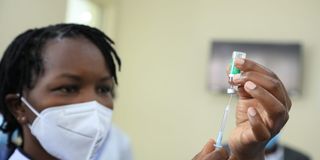IP and Covid: Why proposed waiver may not be enough

A nurse prepares a Covid-19 vaccine dose for administration at the Kenyatta National Hospital (KNH) in Nairobi, following the launch of the vaccination drive on March 5, 2021.
The Covid-19 pandemic, and the race to make vaccines and other useful technologies more accessible to people around the world, has highlighted the tension between intellectual property rights and the promotion of public health.
There is no doubt that the monopolies offered by exclusive rights such as patents are necessary to incentivise pharmaceutical companies to invest huge resources and develop useful drugs.
These rights help manufacturers recoup those investments. It is not only drugs and medical equipment like ventilators which are needed, but also essential technologies such as copyright-protected virus-tracing software.
Yet, as companies which own intellectual property have a monopoly over their products, they are able to raise prices. This may mean less access to life-saving treatments.
Imposing high prices would also be unfair considering that over $12 billion of public funding has been poured into the research and development of the six Covid-19 vaccines.
Calls have been made for companies to pledge to make their intellectual property available to fight the Covid-19 emergency. The WHO has also launched a pool to collect patent and other rights, which could be shared for manufacturing vaccines, therapeutics and diagnostics.
South Africa and India, supported by many other developing countries which face difficulties accessing Covid-19 treatments, are pushing for a stronger measure. They have proposed a waiver of certain parts of the TRIPS Agreement, the WTO international treaty which protects intellectual property. The proposal is still under discussion.
If agreed, it would allow countries to produce and use all anti Covid-19 technologies without fear of infringing intellectual property rights. The measure would be time-limited.
But would a waiver be enough? We argue not.




